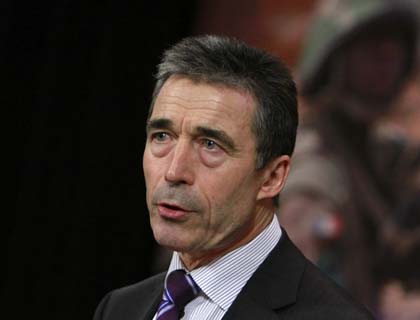KABUL - NATOs chief said he supports talks with the Taliban, but said that it was equally important to apply military pressure to the insurgent group.
In an exclusive interview with TOLOnews, NATO Secretary General Anders Fogh Rasmussen also did not rule out the alliance returning to Afghanistan in a combat role should the country's situation deteriorate after 2014.
Rasmussen said he believed that the best way to secure a political solution to the trouble in Afghanistan was to "continue a strong military on the enemies of Afghanistan" because it would "tempt" them to accept political terms of settlement.
"I am not going to guess the intentions of the Taliban leadership, but what I do know is that the best way to facilitate a political solution is to keep up a strong military pressure," he said.
"There is no contradiction between trying to find a political solution and at the same time continuing the military campaign. On the contrary, a continuation of the military campaign will facilitate a peaceful and political solution. The fact is that if the enemies of Afghanistan realize that they don't have any chance whatsoever militarily, then they will be tempted to find a peaceful and political solution."
When asked if the transition to full Afghan control was based on conditions on the ground or simply a calendar date, Rasmussen did not rule out the possibility of NATO returning to a combat role after 2014 if the situation deteriorated.
"That's actually a hypothetical question," he said.
"Our experience with transition has been very positive and soon new provinces and districts will be handed over to Afghan-lead responsibility. This process is condition-based. We carry out a very careful evaluation of each individual province to be handed over. In that respect, it's condition-based," he added.
"What will happen after 2015, we don't know yet, but of course very much will depend on security situation by the end of 2014. But I am confident, I am confident, that we can complete this transition by the end of 2014."
Rasmussen said he was optimistic about the security transition by 2014, despite a growing undercurrent of pessimism that the country could descend into more violence or economic breakdown.
"I have actually a much more optimistic view of what is going to happen after 2014 because we will stay committed to Afghanistan. We will continue to assist the Afghan people. But our role will gradually change from combat to support," he said.
"After 2014, we will continue to train and assist the Afghan security forces to give advice to make sure that they maintain the capability to take full responsibility for the security in Afghanistan. And I have seen with my own eyes last week when I visited Kabul how professionally the Afghan security forces operate. So, I am quite optimistic."
The NATO leader was interviewed during a pre-summit conference in Brussels last week where NATO member nations planned the agenda for the upcoming Afghanistan-focused summit in Chicago next month. (Tolo News)

